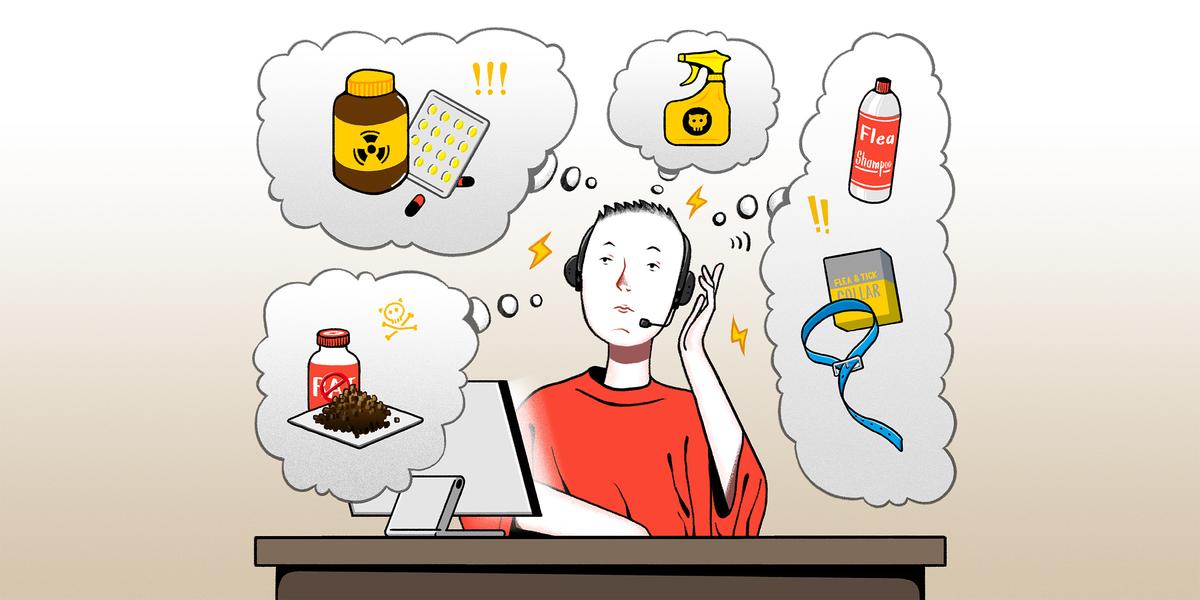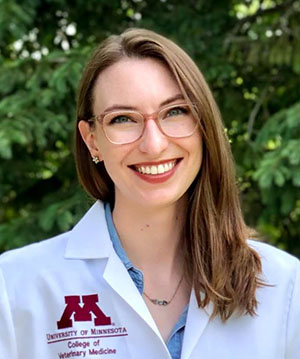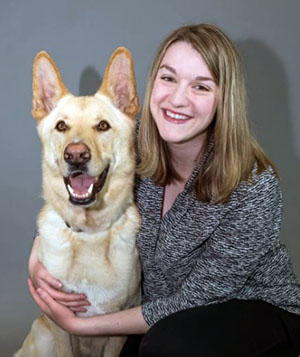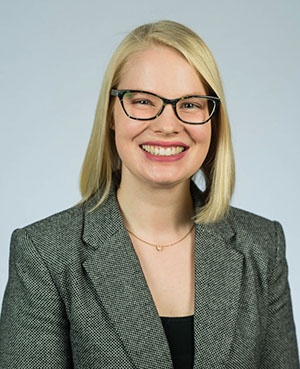Answering the call
Veterinary students gain valuable communication skills as helpline call takers

Veterinary students gain valuable communication skills as helpline call takers
Illustration by Hairun Li
Pet owners are expected to spend nearly $100 million on their animal companions this year. Among those expenditures are products such as flea and tick treatments, heartworm medication, and joint supplements.
The packaging of those products includes a phone number to call with questions or concerns. Give it a ring during the summer months, and chances are a University of Minnesota (UMN) veterinary student will be on the other end ready to assist.
For two summers, Elisabeth Alexander, '21 DVM, was on the receiving end of those calls as a student at the College of Veterinary Medicine and says she gained valuable experience in client communication.
“People will call into the number because they are having a problem with the product or their animal had a reaction to the product or they have questions,” Alexander says. “I would give them information and counsel them about what that reaction meant, what to expect, or what they could do.”

Students like Alexander answering these calls are employed for the summer by SafetyCall International, the world’s largest adverse event reporting call center. The company contracts with clients across numerous industries—including pet health items and other products that may be harmful to pets if ingested—to provide emergency assessment and treatment advice services for those products. While SafetyCall International manages incoming calls from across North America, its roots can be traced back to UMN.
Among its co-founders is Lynn Hovda, ’84 DVM, RPM, MS, DACVIM, who serves as the company’s director of veterinary medicine and also as an adjunct professor for the College of Veterinary Medicine. She works closely with Ahna Brutlag, ’06 DVM, MS, DABT, DABVT, a fellow adjunct professor and director of veterinary services for SafetyCall and its pet toxicology division known as Pet Poison Helpline.
Together, the pair recruit and train veterinary students for positions in the SafetyCall International call center, located in Bloomington, Minn. It’s a job Brutlag knows well, having done it herself as a student and credits the experience for piquing her interest in toxicology.
“After a couple of years of working at a small animal practice full time, I knew I wanted to pursue toxicology as my specialty,” she says. “So then I started at Pet Poison Helpline full time and told myself I’d give it a year and if I like it, I’ll pursue board certification. The rest is history.”
Each year, notices about the call center jobs go out and the positions are filled by students such as Erika Wehmhoff, '21 DVM. Currently finishing her fourth year, Wehmhoff worked two summers with SafetyCall International.

The opportunity proved to be a boon of experience for Wehmhoff, who graduated in May and has accepted a veterinarian position with an urgent care practice. While developing communication skills was a key aspect of the job at SafetyCall, she also gained insight into asking the right questions, recording medical history and note-taking, and building confidence in her ability to interact with clients.
These interactions range from routine product questions to complaints. As with any product, consumers may run into challenges and call into SafetyCall international upset. During their training, students learn that empathy is key to successfully navigating these emotionally charged calls.
“I learned some things over time, and how I handled myself as a person managing these situations is very different from when I started,” Wehmhoff says. “When I did encounter upset callers, I was always empathetic. Because can you imagine how frustrating it would be for your dog to have fleas and you have something that is supposed to fix it but doesn’t seem to be working?”

Exam room interactions between veterinarians and clients can be emotional at times, so a chance to practice having tough conversations and explaining important information proved valuable for Sonja Helgeson, ’20 DVM. Helgeson, who works for a companion animal hospital in Eagan, Minn., says there were tough calls she took over the course of two summers that really prepared her for the reality of working in a practice.
“Sometimes, the call is an emergency. There were some cases where people would apply the wrong product to an animal,” she says. “For instance, certain dog flea and tick products can be lethal for cats. Sometimes I would be talking to someone who would call me and their cat was seizing. I got used to talking to people who were panicked, really emotional, or upset. And so getting my feet wet and dealing with clients in that kind of situation was really helpful.”
As a safety response to COVID-19, a majority of interactions between veterinarians and clients have transitioned away from face-to-face formats. The move has left many veterinary staff and students adjusting to a new normal.
The change has come with fewer challenges for Alexander, Helgeson, and Wehmhoff, who credit their time spent handling phone calls at SafetyCall International as unexpected but valuable preparation for a now virtual reality.
I feel a lot more comfortable knowing that I can counsel clients, use empathy statements, and know how to defuse tough situations over the phone.
Elisabeth Alexander
“There was no way for us to know that a pandemic was going to hit, and we weren't going to be able to talk to our clients face to face, but it ended up preparing me incredibly well for this situation,” Alexander says. “I feel a lot more comfortable knowing that I can counsel clients, use empathy statements, and know how to defuse tough situations over the phone.”
With the pandemic shaping the world for the foreseeable future, veterinary students having a chance to develop client communication skills in any format has its value. Alexander, Helgeson, and Wehmhoff all recommend the SafetyCall International experience as a means of honing communication skills as well as other competencies.
“The opportunity that SafetyCall International provides is incredible,” Wehmhoff says. “For a while when I first started, I wondered if I was hindering myself by not having a more hands-on position. But communication skills are so critical that I don’t wonder about that anymore. I know that it was a very valuable experience.”